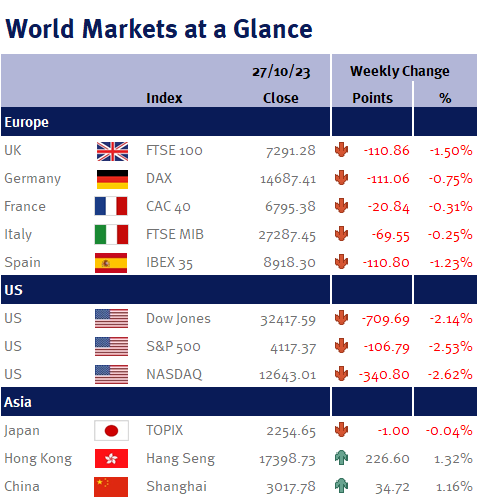Oil prices moderated thanks to growing optimism that the Israel-Hamas conflict could be contained, reducing concerns about potential disruptions in the oil market. Notably, the commitment of the United States and Saudi Arabia to diplomatic efforts aimed at maintaining stability in the Middle East has further eased these concerns.
Looking at China, President Xi Jinping announced new measures to support the economy, such as issuing additional sovereign bonds and increasing the budget deficit ratio and these have been welcomed by the market. Stocks rallied towards the end of the week as the government reported that profits at industrial firms extended gains in September, rising nearly 12%, following policy measures to help stabilize the slowing economy.
The US economy exhibited impressive growth, achieving its fastest pace in nearly two years last quarter, driven by a significant surge in consumer spending. The preliminary estimate released revealed that Gross Domestic Product (GDP) accelerated to 4.9% annualized rate, surpassing the second-quarter pace by more than double. The primary driver of this growth was personal spending, which saw a substantial increase of 4%. Much of this resilience can be attributed to the enduring strength of the job market, which continues to drive robust household demand. As the economy continues to show resilience and strength, there are hopes that the Federal Reserve can orchestrate a soft landing to manage this growth sustainably.
The Federal Reserve is expected to keep interest rates unchanged in response to recent surges in US Treasury yields and a stock market sell-off, which have helped tighten financial conditions.
This past week investors were particularly focused on the earnings reports from major players like Amazon.com, Alphabet, Meta Platforms, and Microsoft, which have previously played a pivotal role in bolstering positive market performance earlier in the year. While the results from these companies largely indicated robust growth, focus on rising costs exerted downward pressure on the stock prices of these industry giants. Market participants might have been hoping for even stronger results from these firms to help offset recent growing concerns surrounding interest rates and geopolitical risks. However, the recent pullback has made valuations more attractive.
Coming up next week we have Chinese PMI, Japanese industrial production, and the Bank of Japan’s interest rate decision as well as Eurozone GDP and inflation data. On Wednesday 1 November the Federal Reserve will meet; markets are widely expecting rates to remain unchanged in the range of 5.25%-5.5%. The following day the Bank of England will also meet again, although markets are not expecting any movement from the current rate at 5.25%. Towards the end of the week, we are also expecting US non-farm payrolls, unemployment and participation rate.
Kate Mimnagh, Portfolio Economist


